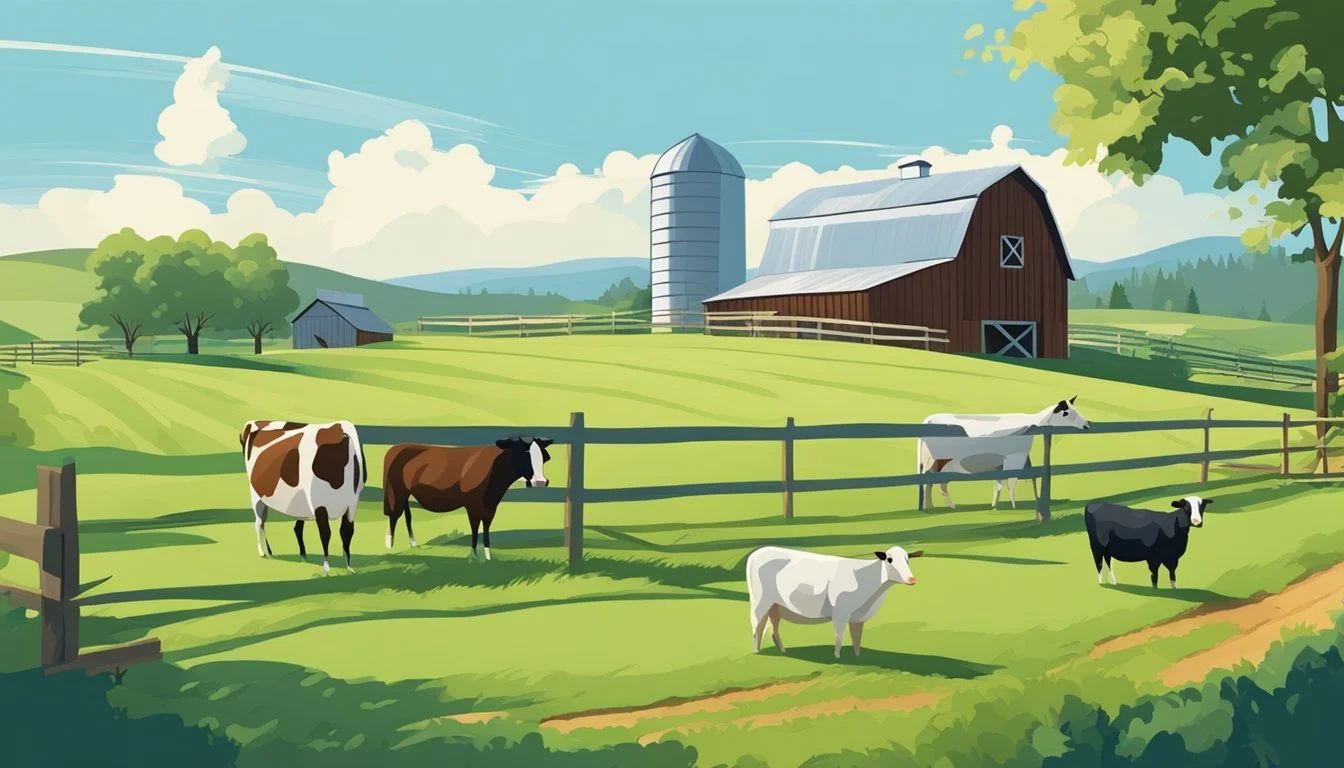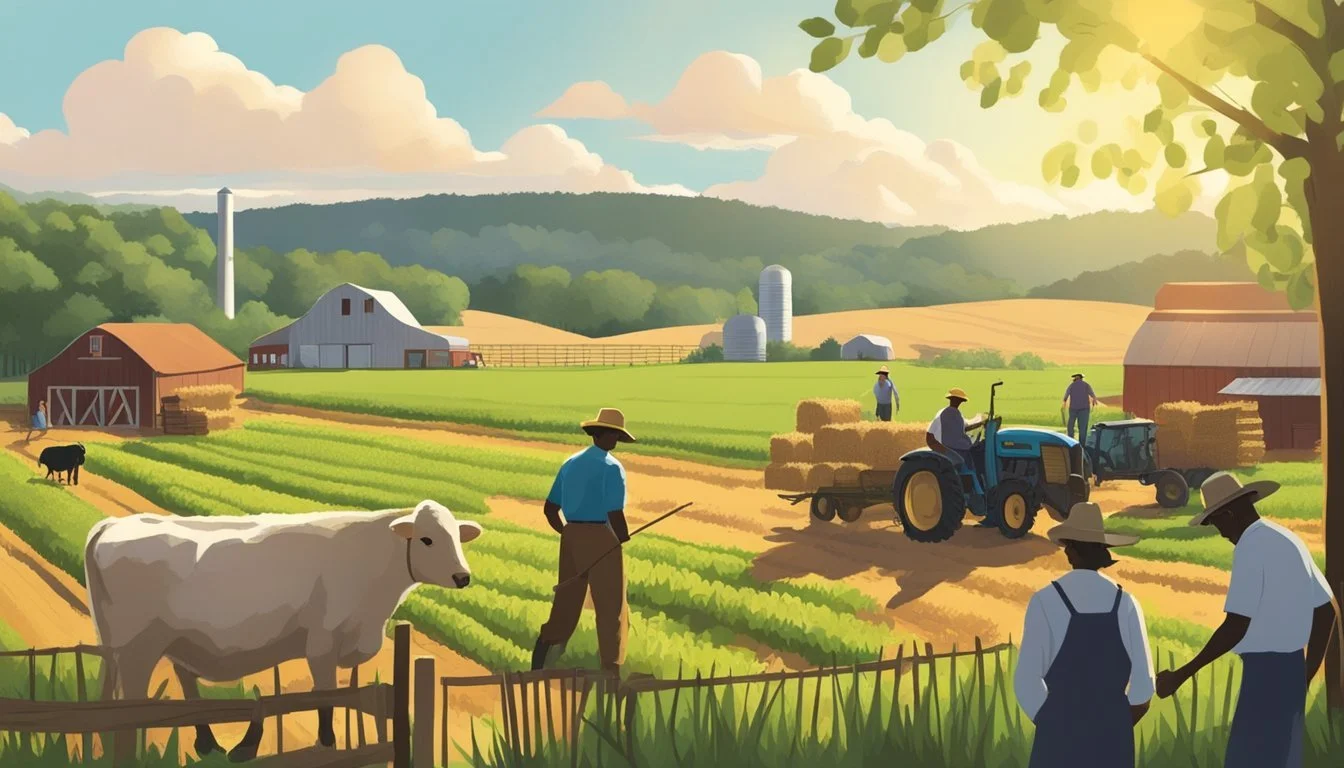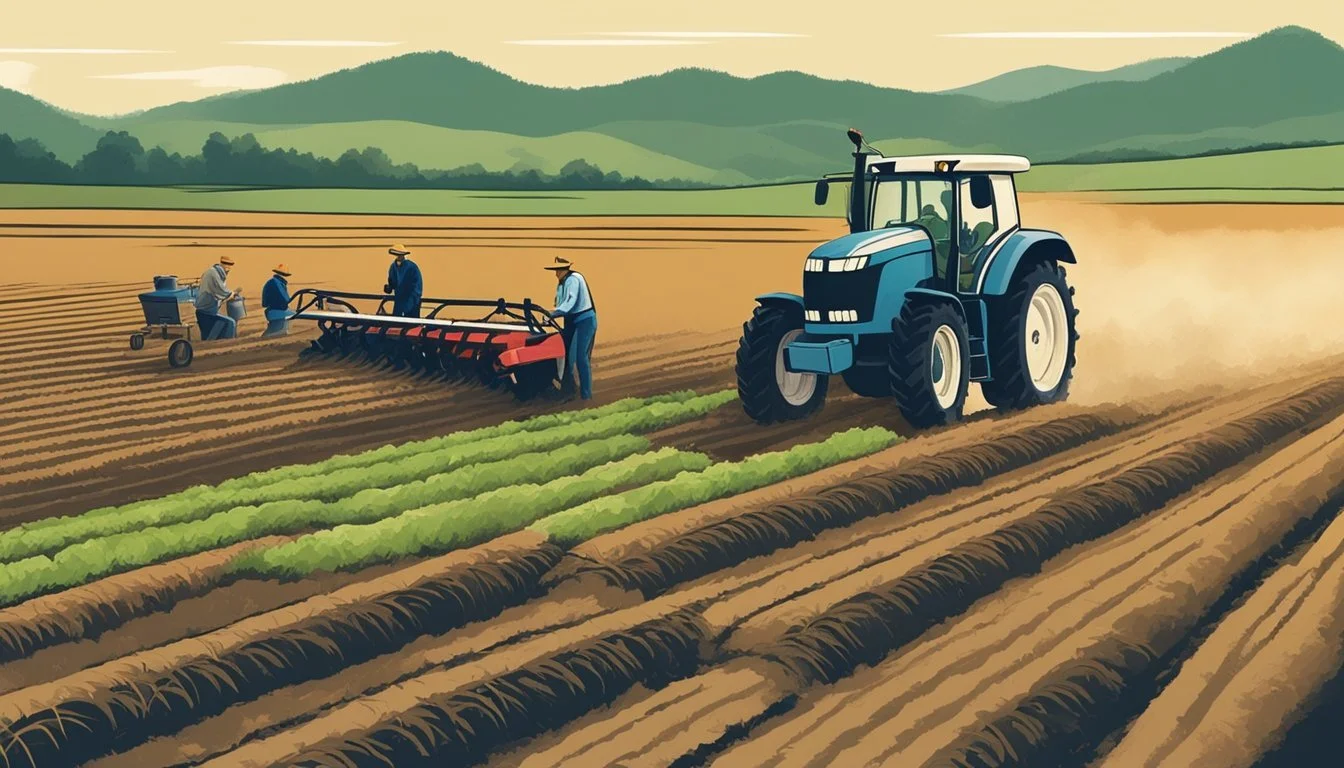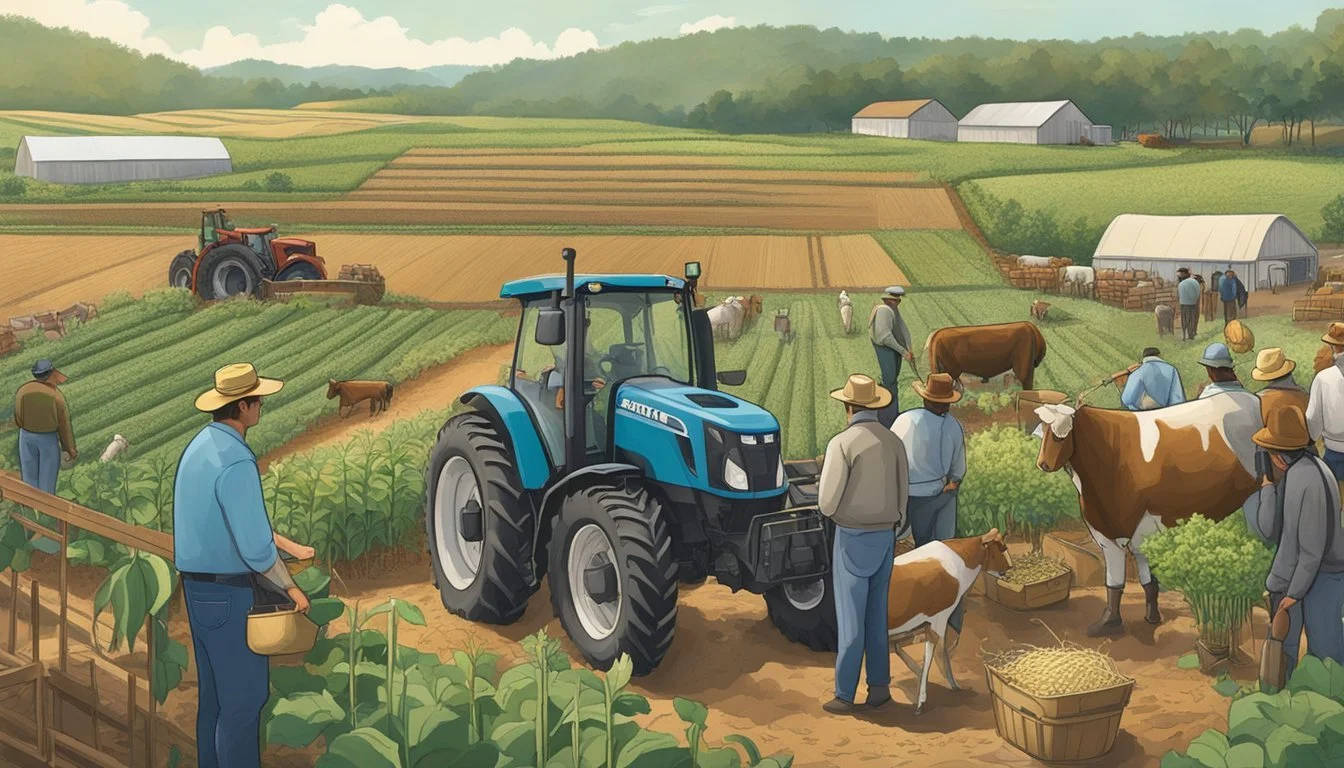Right to Farm Law in Georgia
Understanding Agricultural Protections and Limits
The Right to Farm Law in Georgia roots back to 1980, designed with the purpose of protecting agricultural and forest land resources by reducing nuisance lawsuits against farmers. Despite the legislative protection, the state witnessed a reduction in both farming operations and farmland over the decades. These dynamics highlight the complexities of balancing agricultural preservation with the evolving landscape of property rights and land use.
In 2022, Georgia's legislature revisited its stance on agricultural nuisance protections through the passage of the Freedom to Farm Act, signed into law by Governor Brian Kemp. This act aimed to modernize the existing legal framework, accounting for the changes in the state's agricultural sector and the precedent set by federal court decisions. The new legislation specifically targeted the protection of farmers from nuisance claims, which could arise as residential development encroached on historically agricultural areas.
The nuances of the Right to Farm law in Georgia involve a close examination of the relationship between long-standing farms and incoming neighbors, along with the implications for both property rights and agricultural viability. The Freedom to Farm Act serves as the state's current approach to preserve its agricultural heritage while aiming to mitigate conflicts between land uses in a bid to sustain Georgia's rural economy.
Historical Background of Right to Farm Laws in Georgia
Right to Farm laws in Georgia have been shaped by a series of legislative efforts, reflecting the evolution of the state's approach to protecting agricultural operations. This section examines the inception and development of these critical laws.
Early Legislative Efforts
In 1980, the Georgia General Assembly passed the initial Right to Farm legislation. This move by Georgia lawmakers aimed to shield the state's agricultural and forest land resources from urban encroachment and nuisance lawsuits. However, despite the protective intentions, Georgia has experienced significant reductions in both the number of farming operations and the acreage of farmland.
Evolution of Farm Protection Laws
The Right to Farm Act has undergone amendments over the years to adapt to the changing landscape of agriculture and legal challenges. Key legislative milestones include the revision of O.C.G.A. § 41-1-7, which was influenced by organizations such as the Georgia Farm Bureau, a leading advocate for state agricultural interests. More recent updates, such as the Freedom to Farm Act, were enacted with the support of state Republicans, aiming to fortify legal protections for existing and future agricultural facilities against nuisance claims.
Overview of the Right to Farm Law
The Right to Farm Law in Georgia serves to protect agricultural operations from nuisance lawsuits, balancing the needs of farmers with those of their neighbors.
Definition and Purpose
The Right to Farm Law was established to reduce legal conflicts between agricultural practices and nearby residents by safeguarding farmers who adhere to generally accepted agricultural practices. The fundamental aim of this legislation is to preserve the agrarian landscape by preventing non-agricultural urban sprawl from disrupting legitimate farming operations. It came into being as a response to the suburban encroachment on farm areas and the complaints that would often lead to lawsuits against farmers.
Main Provisions
Statute of Limitations: A pivotal aspect of Georgia's Right to Farm Law is the specified statute of limitations which grants neighbors a limited window—two years, according to recent updates—to file nuisance suits against farming operations.
Freedom to Farm Act: This Act, signed into Georgia law, updates and replaces prior legislation. Its purpose is to offer greater protection to farmers by reinforcing the limitations on the ability to bring nuisance suits against farms. This protection is essential for maintaining the agricultural sector and its contributions to the Georgia economy, while also setting the boundaries for acceptable farm operations.
Protected Agricultural Activities
The Right to Farm Law in Georgia safeguards a diversity of farming operations and practices, ensuring the continuity of agricultural and forestry activities across the state.
Types of Farming Operations
Under Georgia law, the spectrum of farming operations spans across crop cultivation, livestock breeding, poultry farming, and forestry. These operations are integral to the state's financial fabric and ecological well-being.
Crop Cultivation: Includes the nurturing and harvesting of various crops, fundamental to Georgia's agricultural output.
Livestock and Poultry Farming: Protects the raising of farm animals and poultry, which are vital to both local economies and the larger agriculture industry.
Forestry: Timber production is recognized as an agricultural activity, with forests managed for continual growth and sustainability.
Agricultural Use and Practices
The Right to Farm Law encompasses a broad array of agricultural uses and practices, promoting efficient, safe, and environmentally conscious farming.
Land Usage: Land dedicated to agricultural pursuits, whether for planting crops or grazing livestock.
Environmental Stewardship: Encourages practices that aim to protect air, water, and soil quality, aligning with environmental protection laws.
Innovation in Agriculture: Supports the adoption of new technologies and methods that enhance productivity and sustainability in farming operations.
In summary, Georgia's Right to Farm Law grants comprehensive support to agricultural activities, balancing the expansion of farming operations with responsible stewardship of the environment.
Nuisance Protection Provisions
Georgia's Right to Farm laws provide crucial protections for agricultural operations from nuisance claims, setting specific operational conditions to continue preserving the state's farming interests.
Understanding Nuisance Claims
Nuisance claims arise when individuals or groups allege that an agricultural operation is interfering with the use or enjoyment of their property. In Georgia, the Right to Farm legislation is designed to safeguard established farms and forest operations from such claims, especially when the farms were in existence prior to the changes in land use surrounding them. To be protected under these laws, an agricultural operation must prove it has been ongoing prior to the nuisance allegation. This aspect of the law maintains a balance between the rights of property owners and the necessity for robust agricultural operations.
Operational Conditions for Protection
For an agricultural operation to be shielded under Georgia's Right to Farm laws, it must meet certain conditions:
The operation must have been active for at least one year before it gains protection from nuisance suits.
It should be properly located in an area zoned for agricultural use.
The operation must comply with applicable federal, state, and local laws and regulations.
If these conditions are met, the law limits the circumstances under which nuisance lawsuits can be successful against agricultural facilities. This legislative intent is clear: to discourage nuisance lawsuits that can hinder the economic stability of Georgia's farming industry.
Impacts and Implications for Farmers
The Right to Farm Laws in Georgia provide significant considerations for those in the agricultural sector, with distinct impacts for farm owners and surrounding communities.
Benefits for Farm Owners
Protection for Agricultural Practices: The Freedom to Farm Act offers important safeguards for farm owners against nuisance lawsuits, particularly when farms are operating within areas zoned for agricultural use. Farmers receive a layer of legal defense intended to sustain their operations and diminish the threat of legal actions from new property owners who might oppose existing agricultural practices.
Long-term Stability: For many farmers, the ability to plan for the future without the looming risk of lawsuits from neighbors can translate into more stable business operations. This stability is bolstered by the support of organizations such as the Georgia Agribusiness Council, which advocate for the protection of farmers' rights to manage and operate their lands with fewer restrictions.
Controversies and Criticism
Opposition from Neighbors & Property Owners: Despite the measures of protection it provides to farmers, the Freedom to Farm Act has elicited controversy. Neighbors and property owners adjacent to farms may feel that their rights are overshadowed, leading to criticism that the law privileges farm operations at the expense of residential comfort and property use.
Concerns Over Environmental Impact & Accountability: Opponents of the law argue that it could give license to disregard environmental responsibility. Critics worry that the law may limit the avenues for holding farming operations accountable for practices that negatively affect the environment and, by extension, nearby residents.
By delineating the operational space for farmers and specifying the limitations of nuisance claims, Georgia's Right to Farm Law seeks a balance between promoting agribusiness and addressing the concerns of neighboring communities.
Legal Challenges and Case Law
In Georgia, Right to Farm laws have been subject to legal scrutiny, with various cases testing the limits and applications of these laws. The focus of this section is on significant cases that have set precedents and how courts interpret the intricate balance between agricultural activity and neighboring property rights.
Notable Right to Farm Cases
Several key lawsuits in Georgia have hinged on the Right to Farm Act. Plaintiffs often allege that farms engage in negligent operations causing undue nuisance or improper use of land. Defense for the farms typically revolves around the protection granted by the Right to Farm statute, arguing that their operations are lawful and longstanding and that claims by newcomers to the area cannot override the farms' rights.
Case Example: In a well-documented case, neighbors of a large-scale farm filed a lawsuit claiming that the noise, traffic, and odors from the operation constituted a nuisance. The farm, which had been in operation well before the plaintiffs moved into the area, relied on the Right to Farm defense.
Outcome: The court upheld the farm's immunity from such suits under the Right to Farm law, emphasizing the intention of the legislation to safeguard agricultural practices deemed essential for the state.
Precedents and Legal Interpretations
The interpretation of Right to Farm laws in Georgia often revolves around the specifics of each case, where courts consider the history of the farming operation, the character of the area, and the conduct of both the farm and the complainants.
Legal Interpretations: In cases where farms are found to have operated for years without prior complaint and without changes in their practice, courts have tended to favor the agricultural operations under the Right to Farm laws.
The following points outline essential precedent-setting elements:
Established Farming Operations: Courts examine whether the farm's activities were established before the plaintiffs' arrival or purchase of nearby property.
Lawful Farming Practices: Key determinations include whether the farm operates within the bounds of state and local regulations.
Change in Farm Practice: Another consideration is whether the farming operation has significantly changed, leading to increased conflicts with the neighbors.
The culmination of these cases continues to shape the legal landscape in which Georgia's Right to Farm Law is applied, balancing the growth of agricultural business with the rights of neighboring residents.
Amendments and Revisions to the Law
Georgia’s Right to Farm laws have undergone significant changes through legislative amendments, aiming to balance the interests of agricultural operations with those of residents in the state.
House Bill 545 (HB 545)
House Bill 545, also known as the 'Musella Republican's bill', refers to legislation proposed by a Musella Republican which sought to make revisions to Georgia's Right to Farm statutes. HB 545 was significant because it aimed to restrict the window during which nuisance lawsuits could be filed against farms, offering farmers more robust protections and mitigating the risk of legal action from new neighbors in areas where agricultural operations had been established.
Recent Legislative Changes
Governor Brian Kemp played a pivotal role in the further evolution of the Right to Farm laws with the enactment of House Bill 1150. This legislation, which was signed into law on April 13, 2022, represents a recent iteration of the state’s commitment to protect agricultural facilities and operations from nuisance lawsuits. Importantly, House Bill 1150 introduced the provision that such lawsuits must be filed within two years of the start of an operation. Should an agricultural facility convert to a confined animal feeding operation, this two-year legal clock resets, marking a noteworthy amendment to existing law. The bill replaces an earlier law from 1980 that previously governed nuisance suits related to farming activities.
Stakeholder Perspectives
The Right to Farm laws in Georgia have garnered mixed reactions, with strong opinions from various stakeholders about benefits and drawbacks.
Support from Agribusiness and Farm Advocates
Agribusiness entities and farm advocates like the Georgia Poultry Federation and the Georgia Farm Bureau champion the Right to Farm laws, viewing them as essential for the protection of agricultural practices. They argue that the legislation:
Ensures stability: It provides certainty and protection for farmers by minimizing the risk of nuisance lawsuits.
Encourages growth: These protections are seen as vital for the longevity and expansion of the agribusiness sector.
Environmental and Community Concerns
Conversely, environmentalists, community advocates, and some small farmers have expressed concerns:
Impact on local communities and environment: Critics argue the laws can limit local recourse against potential environmental damages caused by large farming operations.
Charlotte Swansea, an environmental advocate from Gordon County, highlights the tension between preserving the rural landscape and expanding agribusiness.
Georgia Forestry Association: While supporting the industry, they are also involved in ensuring sustainable forestry practices that do not harm the local ecosystems.
Each group must navigate the complexities of these laws to balance the growth of Georgia's agribusiness with the well-being of its communities and natural resources.
Right to Farm and Property Rights
The Right to Farm laws in Georgia mediate the balance between property rights and agricultural practices, aiming to protect farm operations from nuisance lawsuits while also considering the rights of residents. Legislation affects the use of agricultural land and forest land resources, along with commercial aquaculture practices, shaping the relationship between landowners and the environment.
Balancing Farming and Residential Interests
Agricultural land and forest land resources are central to Georgia’s economy, yet they must coexist with residential properties. The Right to Farm Law strikes a balance by:
Allowing reasonable farming activities that are essential for the state’s economy.
Limiting exposure to lawsuits related to noise, odors, and other nuisances often associated with farms, provided these farms comply with legal and regulatory standards.
Residents' interests are protected through:
Zoning laws that separate residential areas from agricultural operations.
Ensuring that farming methods do not unlawfully impede on residents’ use and enjoyment of their property.
Protecting Landowner Rights versus Farm Operations
When discussing property rights and commercial aquaculture, it's important to note:
Landowners are expected to use their property in ways that do not harm their neighbors, including the impact on the environment and resident use.
Farm operations, on the other hand, are given certain protections to operate without the constant threat of being deemed a nuisance, which is crucial for the state’s agricultural productivity and food supply stability.
However, these protected rights are not absolute and include:
Compliance with existing environmental regulations.
Adherence to best management practices to minimize potential conflicts with neighboring land uses.
Future of Farming and Right to Farm in Georgia
The landscape of agriculture in Georgia is evolving, influenced by new legislation and changing socio-economic conditions. The impact of these changes on farming operations and rural communities is significant, shaping the long-term sustainability and legal framework within which the agricultural sector operates.
Trends and Changes in the Agricultural Landscape
Trends: Agricultural facilities in Georgia are facing an evolving environment due to various factors. Advances in technology have revolutionized farming practices, improving efficiency and production. However, a reduction in farming operations and farmland has been recorded, suggesting a shift in the state's agricultural dynamics.
Agricultural facilities: Modern feeding operations and farming methods have replaced some traditional practices, necessitating adjustments to local and state regulations.
Technology: The implementation of cutting-edge technologies aims to increase production while mitigating environmental impacts. Precision agriculture, for instance, enhances resource management and crop yields.
Changed conditions: Despite the advancement in agricultural technologies, external pressures such as urban development and economic challenges continue to reshape the rural landscapes of Georgia.
Legislation Outlook and Advocacy
Legislation Outlook: The Right to Farm laws in Georgia have undergone revisions to address the contemporary needs of the agricultural community and balance the interests of rural residents. The latest iteration of this legislation, known as the Freedom to Farm Act, was signed into law in April 2022.
Georgia Grown Farm to Food Bank: As part of Governor Brian Kemp's administration's support for the agricultural industry, initiatives like the Georgia Grown Farm to Food Bank signify the state's commitment to strengthening the connection between farmers and community welfare.
Advocacy: Organizations such as the Georgia Farm Bureau represent the interests of farmers and rural communities, playing a pivotal role in shaping agricultural policy and supporting legislation that nurtures Georgia's number one industry.
This section has analyzed the key factors influencing the future of farming and the Right to Farm in Georgia, focusing on the integration of technology with agriculture, the implications of evolving farming practices, and the legislative changes aimed at safeguarding the state's agricultural heritage.






